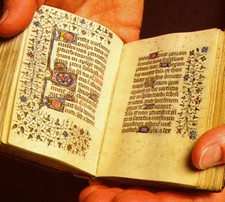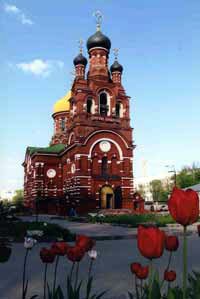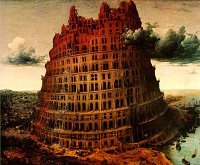I have never had a flair for fashion. In college I was called Professor and Doctor Hoffman largely because I wore sport coats and vests year round. In Russia my sport coats were less obtrusive among people my own age in the warmer months, but it the winter, which in Russia starts in November and drags on until April sometimes, I struggle because typical Russian winter clothing is simply too heavy for me and because of the indoor sauna effect in almost every Russian indoor space - if its minus ten outside, you can bet its plus 20 inside. The colder the weather, the more insane the indoor central heating. Managing the outer-garment as aspect of this thermal anomaly only became an issue for me in Russia. Adjusting my clothing to real seasons was and remains a serious financial, physical and behavioral challenge for me. Early in my experience in Russia, I had a lot of help.
One of the most amazing acts of charity I ever experienced in Russia was in 1995 when I was living in Optina Pustin. When I first came, the monks gave me a scratchy handmade woolen coat. This was a simple, short waist coat, the kind used by manual laborers on the kolkhoz. It was plain grey, with a small flared collar and four black plastic buttons - a poor imitation of a military issue design. It came with other stuff, too, mittens and a white dress shirt - all handmade. Not elegant, to be sure, but they fit and were durable. Wearing the coat, I felt very much a part of things and must have looked the part as well because, if I kept my mouth shut, fewer people asked me where I was from. I blended in.
I was informed that the coat was 2nd hand, part of a very small collection of worldly possessions left behind by a certain monk Lazar, who had died only recently before I arrived at the monastery. Lazar was one of many who had been working at the Chernobyl Nuclear Facility in the Ukraine in 1986 when they had the meltdown. There simply wasn't much more information on the man - he became Orthodox as a result of his condemned state and when the cancer progressed to a certain point in the 1990's, he departed for Optina and became a simple monk in the hopes to spend his remaining time on earth in repentance. He died in the summer of 1994. He was in his mid 40's.
This coat was my treasure. It was the perfect coat for me. Warm, but not super warm and not at all heavy. It was the kind of coat you took off when coming into a building but could leave on in Church if is wasn't that hot. It had pockets. I literally wore the jacket threadbare and after I was married – 6 years later - my wife, not caring a fig about its sentimental value and seeing that is really not much more than a dirty rag, threw it out. I can't blame her, but I would still have liked to have kept it.
The following winter of my first year in Russia, I became acquainted with Hireodeacon Iliador, a massive grizzled Georgian man with a hook nose who was reputed to have been a notorious bandit haunting the area around the monastery before it was returned to the Church in 1988. He became a monk early in the history of the re-opened monastery and before long he became a deacon. He had the strongest, most majestic voice I have ever heard in church. Though in personal communication it was clear he had a pronounced lisp, when he bellowed out the litanies during services this defect somehow enhanced the musicality of his voice. Fully decked out in his Church vestments, he resembled nothing short of a Georgian king. His voice made me weep, especially when he sang the prokimenon during vespers on Sunday evening: 'the Lord is enthroned, He is clothed with Majesty' - I felt and still feel that I am not on earth when I hear him erupt with this solemn but triumphant point in the All night Vigil.
Fr. Iliador was known for his generosity and he always had something in the deep pockets of his podrasnik. Toys, candy, money, prosphora, fruit, tools, handy items and unusual items – he seemed to be a bottomless pit of stuff. He was always giving something to everyone, to strangers and friends. He would often give me a bag of candy or a candle or prosphora. I can't remember the exact occasion, but sometime after the Nativity season, where there was still heavy snow, he gave me a magnificent black overcoat. He called me to follow him to his cell, a place where pilgrims at the monastery were not supposed to be except in special circumstances like for obedience or to get a blessing. He went into his cell, rummaged and returned with this fantastic black Russian winter coat, the heaviest I have ever worn and virtually unused. It had a silk lining and deep outer as well as inner pockets. It was the kind of coat that I had seen on lay priests and, having long hair and scruffy beard myself, I was very often mistaken for a priest when I wore it. I have never seen winter coats like these in stores, but it was extremely well made and I couldn't tell if it was a product of mass manufacture or the work of a professional tailor. The coat was so heavy that I could dress very lightly underneath, without layers, and still not even feel the wind. It must have been 5 cm thick. It was a bit uncomfortable indoors because taking it off was like removing armor and as it didn't fold easily, it was sometimes hard to find a place to put it if there wasn't a coat rack. It was easily the most luxurious item of clothing I have ever possessed. It totally changed my perception of the Russian winter and my feeling of acceptance in Russian society, which moved from being invisibly enumerated among the locals to loosing my title as the anonymous 'maladoy chelovek' (young man) and gaining the formal (plural) personal pronoun 'vyi' – a common sign of respect for adults opposed to the more familiar 'ti' used by peers or adults addressing youth. I wore the coat for the remainder of the winter and lugged it around when I returned to Moscow. When I left Russia in the summer of 1995, I couldn't take it with me because it was so huge I had no place for it in my luggage. I gave it away. I cannot speak of the number of times I have kicked myself for this, nor how I wish I had such a coat now.
Material things flowed very freely in the monastery, but less so in Moscow. Still, the generosity of Russians is never to be underestimated. I have found charity in Moscow to be effulgent in a different way, partly because I have established myself and perhaps no longer look like an obvious candidate for charity. My integration has also hardened me a bit, too. I am less vulnerable to 'attacks' of goodwill and the fascination with 'white elephants' that are so often traded in acts of spontaneous generosity has waned. Having acquired the familiar trappings of routine and responsibility, I am also simply less open to the primordial depth and earnestness of contact with strangers in Russia. I no longer see how special these moments are, I think about my personal space and my time as if they were, in fact, mine. There is, for sure, an patent aggressive element to contact among strangers in Russia that is managed by common courtesy and higher levels of personal shame in other countries. You can ask a stranger for the time, but your average Russian might just as often start a philosophical conversation. Mental illness not included. This goodwill without a seat belt often throws me off balance. I used to find it fascinating to engage unknown people on issues of love and culture in the train, but now I feel awkward. Furthermore, I simply don't know how to receive unwanted gifts very graciously. One would think this would be a talent that didn't need to be exercised very often – but in Russia such a social skill is a staple of everyday tact.
I see our priests in Church at the analogion confessing the huddled masses. They are literally getting gifts in one hand and passing them out with the other. They don't even look. I recall the story from the life of Archbishop John where a wealthy parishioner wanted to make a donation to Vladika's charity programs and gave a substantial sum in an envelope to the archbishop. The man observed that Archbishop John never even looked at the envelope but simply handed it to the very next person, a poor woman, who had come to get his blessing. I have witnessed and even been the subject of such charity here in Russia. But interaction with ordinary people on this level can nevertheless be quite a culture shock, even for this guest who has been here for more than 10 years now.
It is deep fall in Moscow now. The ground has frozen and patches of stubborn snow refuse to melt in the clear afternoon sun. For me, it is paradisiacal weather - warm enough not to require a winter coats but cool enough to be a refreshing break from the stifling heat of indoor environments. I go to church wearing (surprise) a sport coat. With the local villains all bundled up in Antarctic fervor, I naturally get looks from people on the street. It’s as if I am walking about naked or with a sign on my head. Sometimes it’s funny. Sometimes it’s just weird and hard to bear.
I was accosted the other day outside our parish church by a woman who insisted I was cold and demanded I take some socks she magically happened to have in her purse. Surreal moments like this require cool-headedness. The bizarre context of the situation caught me off guard and as the difference in spoken Russian between the bewildered inquisitive 'Aren't you cold?' and the incredulous accusation, 'YOU ARE COLD NOW!' can only to be determined by the subtlest variation in tone and inflection, I was duly flummoxed. To those unprepared for the authoritative Russian approach to concern for their fellow man, the two phrases are, grammatically speaking and word for word, identical. Instead of just saying no, I'm fine and I don't need the socks, thank you, I let myself be overwhelmed by the annoying Russian paternalism that grants moral authority to those who would be your benefactor.
I asked the woman in the unabashedly annoyed voice of a frustrated foreigner if she thought I was a homeless person.
She paused to consider her answer. I think she initially assumed I was a homeless person but reconsidered this opinion when it became clear I was a foreigner. She was unprepared, I think, for my resistance to her offer.
She repeated her insistence that I was cold (now it was clearly not a question but a statement of fact) and wagged socks at me, insisting I take them. ''Really, I have lots of them. Its no trouble.'' I still had the opportunity to politely refuse, but instead indignation took over when annoyance left off and I mumbled something in my less than articulate Russian about my capacity to know if I was warm or cold myself, without the advice my adopted mother on the street. We both entered the church a little self conscious about our physical proximity to each other in a house of God.
Of course, I thought to apologize – I do sometimes. I was just so mentally eviscerated by the Russian approach to concern for others, which however well intended is just plain aggressive at times. I felt very much like a object and not a person and I was both shocked and aware of my misplaced cultural sensitivity at the same time. As an American, I am so used to maintaining a threshold of perceived independence and right to my opinion that when someone crosses this invisible line, I allow myself to feel violated in a way I know is not intended or even understood by those who step over the line. It is, after all, a rather deranged proposition to feel threatened by charity. Yet I continue to insist that common courtesy and consideration for the inevitable differences of opinion on matters of personal comfort are also forms of charity, however undervalued these notions are in Russian society. I keep telling myself that I am a guest in Russia and that it is I who must adapt, but some dispositions are too deep to be moved. In preserving my fake inner world, I miss opportunities to connect.
I am reminded of other themes from the life of Archbishop John, who was a foreigner in three different countries for most life as a bishop and archbishop. He was often subject to the indignant attitude of fellow clergy (invariably Russians) when he didn't wear shoes or went inappropriately under dressed in cold weather, which he did often. He was known to growl a bit at these perfunctory foibles. In one incident in which fellow hierarchy demanded that he wear shoes, he simply carried a pair around with him but didn't put them on his feet. When they later would ask him where his shoes were, he would produce them and show that he indeed had them (the word for 'wear' and 'carry' is the same in Russian).
These stories make me smile and I allow myself the illicit pleasure of identifying myself with Archbishop John in this regard, however dissimilar we are in our manner of life and disposition of soul. Archbishop John was a saint, of course, and the flames of Divine love in his heart were no doubt stoked by greater pains than the mere stings of ants. But for me there is real anguish of soul, and I see that however elementary, my self induced suffering is real enough. More than just ingratitude, it is hurtful to others. Archbishop John was perhaps mildly irritated with the focus of his fellow clergymen on the mundane affairs of fashion, but I am embarrassed to behave so rudely to people who are after all just being nice. I hope someday I can just take the socks without grumbling. It won't make me a saint to accept the gruff but well intended kindness of Russians, but it will take a little humble pie to go down without the salt of flippant commentary. I hope the Lord will accept this as a sacrifice on the altar of love, for my sake. I can't possibly entertain the hope that my Russian hosts will understand such a disposition.









